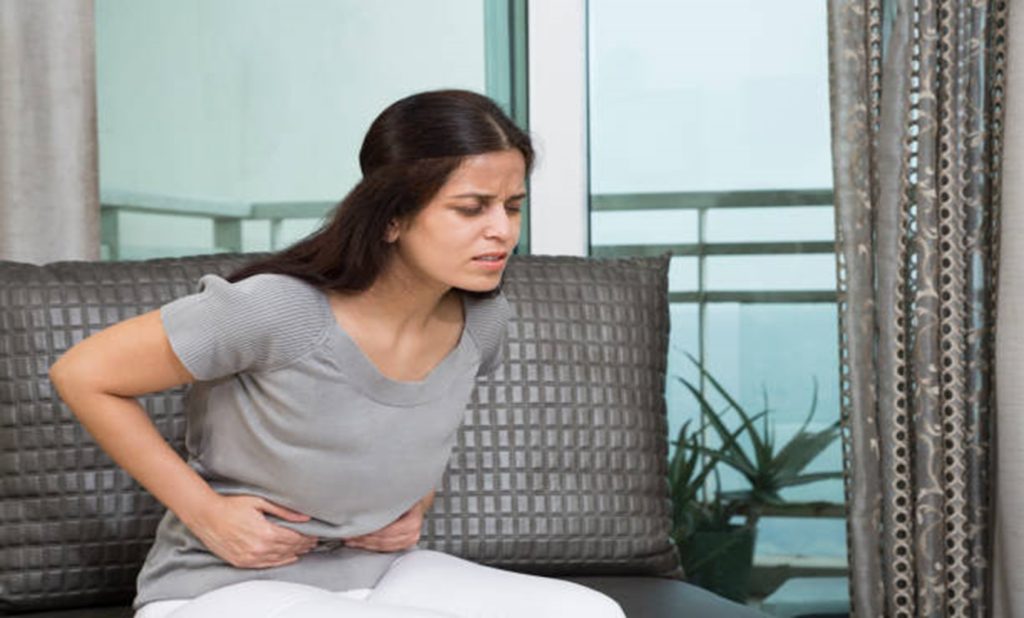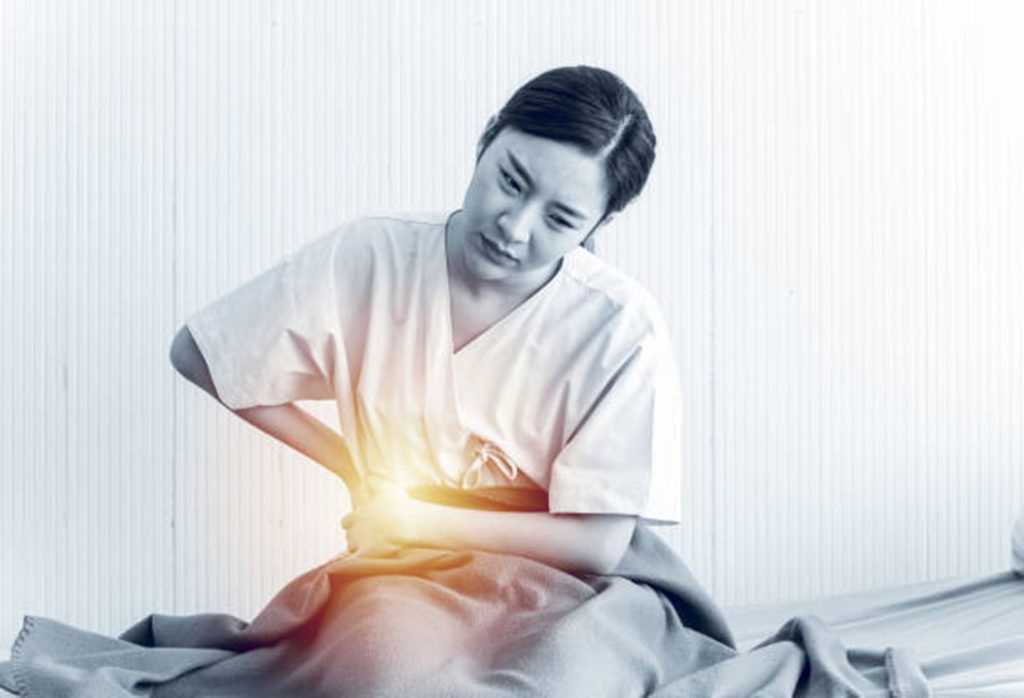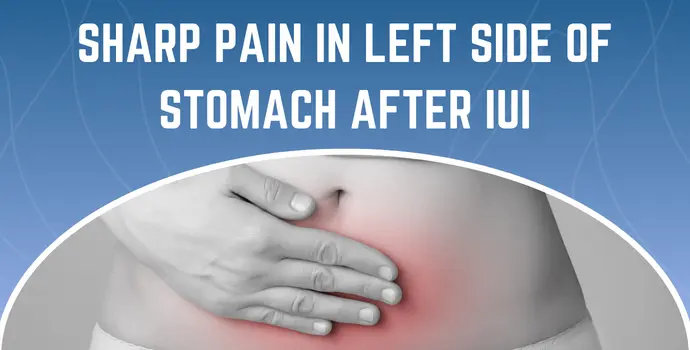IUI is the first step towards pregnancy for many couples with fertility challenges. IUI treatment in India which is quite popular is generally seen as safe and less invasive. But, some may feel pain or have side effects after it. Among these, feeling sharp pain in left side of stomach after IUI treatment can be concerning. It raises important questions about its cause, significance, and when to seek medical advice.
Do not neglect pain, Schedule an appointment for a consultation with an expert.
Let’s start addressing your concerns regarding how serious is a sharp pain in left side of stomach after IUI.
Is It Normal To Have Pain In Left Side Of Stomach After IUI?

IUI treatment may cause mild discomfort or cramping. It involves inserting sperm directly into the uterus. This can irritate the uterus and surrounding areas.
However, sharp pain, especially localized to one side of the stomach, is less common and can raise concerns among patients. It might not always signal a serious issue. But, knowing its potential causes is crucial for peace of mind. It also ensures prompt treatment if needed.
Let’s check out why you are experiencing such sharp pain.
Causes Of Sharp Pain In Stomach After IUI
Dr. Hrishikesh Pai, a distinguished IVF doctor in India, says “Each person’s experience with IUI and recovery varies a lot. So, open talk about your symptoms is needed for effective treatment”.
He has over 40 years of experience and is the co-founder of Bloom IVF, one of the leading chain of fertility clinics in India.
Here are some factors that may cause sharp pain after IUI.
Ovarian Hyperstimulation Syndrome (OHSS): In some cases the doctor uses fertility drugs to stimulate ovulation before IUI, leading to swollen, painful ovaries. Symptoms can range from mild to severe and include lower abdomen and lower back pain after IUI.
Infection: Any procedure involving the uterus carries a risk of infection, which can lead to pelvic or abdominal pain if not treated promptly.
Ectopic Pregnancy: Though rare, IUI can sometimes result in the fetus developing outside the uterus, often in a fallopian tube, causing sharp pain and requiring immediate medical attention.
Ovarian Cyst Rupture: Fertility treatments can increase the likelihood of developing ovarian cysts, which can sometimes rupture, causing sharp, sudden pain on one side of the abdomen.
Get an expert’s opinion by connecting with us.
If you are concerned about some other symptoms after IUI treatment, keep reading below to learn more.
Lower Abdomen And Lower Back Pain After IUI

Feeling lower abdomen and lower back pain after IUI is common. There’s no need to panic. It’s often due to the body changes from the procedure.
While discomfort is usually mild and temporary, it’s essential to stay aware and seek medical attention if symptoms persist or worsen.
These are the following factors that may cause lower abdomen and lower back pain after IUI:
- Uterine Contractions: The insertion of catheters during IUI may trigger temporary uterine contractions, leading to mild cramping.
- Implantation: Some women may experience implantation cramps as a result of the embryo attaching to the uterine lining.
- Pelvic Inflammation: Infections or inflammation in the pelvic region can cause persistent discomfort.
Coming to the most important part, find some information below to learn how to manage stomach gurgling and pain in left side after your IUI treatment.
Managing Pain And Discomfort After IUI
Rest and Relaxation:
Devote enough time for resting after the IUI procedure. Abstain from tasks, which may be strenuous and worsen the pain, and focus on gentle movements and relaxation techniques.
Pain Medication:
If you feel any unusual pain after your treatment, consult your doctor immediately and strictly avoid taking any over-the-counter medicines as they are not considered safe during fertility treatment.
Heat Therapy:
The application of a heating pad or a hot compress to the area where the cramps are felt can help relax muscle knots and alleviate stomachache. Check the heat intensity to not cause any skin irritation.
Hydration and Nutrition:
Drink enough water and consume electrolyte-rich substances like coconut water or watermelon juice to replace lost fluids. Moreover, consume easily digestible, healthy foods with high nutritional value to make your body recover faster.
Pelvic Rest:
Do not engage in sexual intercourse or use of tampons right after IUI treatment, as these activities may heighten pain or disrupt the delicate process of the reproductive system.
However, trusting your instincts and prioritizing your health and well-being is paramount. If you’re unsure why your symptoms persist even after medications and proper care, immediately seek advice from a qualified fertility expert.
Your doctor can assess your situation, provide personalized guidance, and recommend appropriate steps to address your concerns effectively.
Don’t let discomfort linger. Reach out to a trusted healthcare provider.
Conclusion
Summing up, whenever you feel sharp pain in left side of stomach after IUI, you need to have a closer look at it and be active in taking measures for your health. On the other hand, minor pain is usually part of the process, so you should be aware of any persistent or serious pain that requires medical attention.
You should seek the help of a certified fertility specialist such as Dr. Hrishikesh Pai, a prominent doctor for IUI treatment in India for personalized guidance and necessary interventions.
Don’t hesitate to seek medical assistance, Schedule an appointment today.
Still, have some doubts?
FAQs
How Long Does Sharp Pain Last Post-IUI?
- Duration varies, typically resolving within days to a week for mild to moderate discomfort. Persistent or worsening pain necessitates medical review.
When Is Sharp Pain A Cause for Concern?
- Severe pain accompanied by fever, nausea, abnormal bleeding, or faintness warrants immediate medical attention, as it could signal complications.
What Are the Signs of a Failed IUI Treatment?
- Symptoms of a failed IUI treatment may vary depending on individual circumstances and underlying factors. However, common indicators include; getting periods, multiple negative pregnancy tests, and the absence of pregnancy symptoms.
References:
https://my.clevelandclinic.org/health/treatments/22456-iui-intrauterine-insemination
https://www.healthline.com/health/intrauterine-insemination-iui

